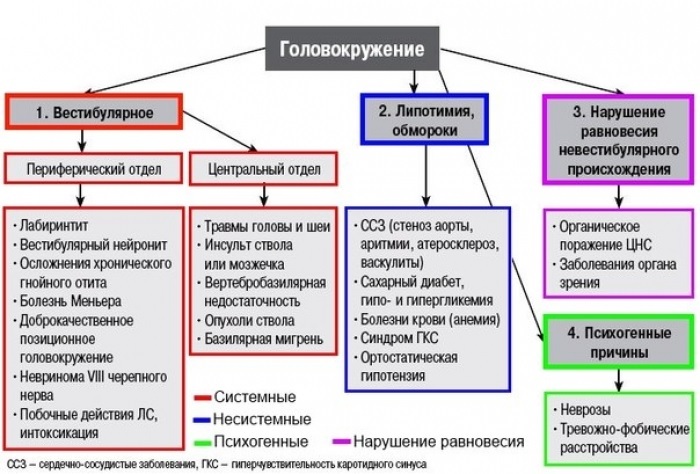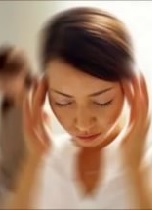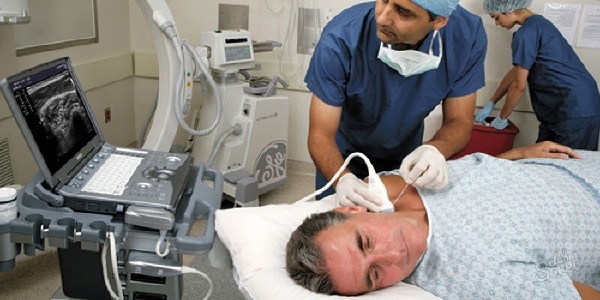Why in the morning do you feel sick, dizzy and dizzy?
Contents:
- Symptoms of
- Symptoms of nausea and dizziness
- Circulatory disturbance
- Hormonal diseases
- Digestive system diseases
- Vestibular apparatus defeat
- Treatment
- Conclusion
 Why does the vomiting and dizziness start in the morning? And what is the reason for the sluggishness at the beginning of the day? There are many factors that affect the body, which cause lightheadedness and dizziness, so you need to know how to deal with them and to which doctor to apply.
Why does the vomiting and dizziness start in the morning? And what is the reason for the sluggishness at the beginning of the day? There are many factors that affect the body, which cause lightheadedness and dizziness, so you need to know how to deal with them and to which doctor to apply.
Symptoms of
Dizziness in the morning when getting up and nausea are accompanied by other symptoms. In particular, it is:
- Dry mouth.
- Loss of balance.
- Feeling of flies in the eyes.
- Unpleasant sensations in the stomach, right upper quadrant.
Dry mouth is associated with disorders in the autonomic nervous system, hormonal problems, dehydration. It occurs with non-insulin-dependent diabetes mellitus along with such symptoms as severe thirst, copious urination. Nausea in diabetes is caused by hypoxia of the vestibular centers of the brain responsible for the balance. Glycated hemoglobin is not able to fully replenish the oxygen deficiency.
 Female PMS: can the head be dizzy before menstruation and how to get rid of an unpleasant symptom?
Female PMS: can the head be dizzy before menstruation and how to get rid of an unpleasant symptom?
Symptoms of sunstroke in adults and children: the main signs, treatment.
Vegeto-vascular dystonia may be accompanied by dry mouth, as well as dizziness, especially when you get up. Flies in the eyes - the consequence of brain ischemia and lack of oxygen. Vertigo in the morning when getting up - the result of belated regulation of vascular tone.
Nausea, spasms in the stomach, pain in the right upper quadrant are symptoms that are often complained about in addition to losing a sense of balance and reeling. These are signs of disruption of the vestibular apparatus.
Causes of nausea and dizziness
Why does my head spin and melt in the mornings? There are many factors that influence this. Vertigo in the morning and nausea after getting up are caused by the following reasons:
- Insufficient sleep affects various centers of the brain - vestibular nuclei, vasomotor center. Therefore, when some people get up in the morning, they feel nauseous and dizzy.
- Circulatory disturbance in an uncomfortable position during sleep.
- Endocrine diseases: adrenal insufficiency( hypoadrenia), hypothyroidism, diabetes mellitus of the first and second types.
- Diseases of the gastrointestinal tract, pancreas, liver.
- Dehydration.

- Disturbance of cerebral circulation, low blood pressure. Low blood pressure - the cause of the appearance of flies in the ears when you get up. Reduction of blood pressure when moving to a vertical position for more than 10 mm Hg. Art. Is called orthostatic hypotension.
- Vegetosovascular dystonia, heart disease, including: acquired valve anomalies, blockages, the presence of additional bundles of the conducting system and ectopic foci of excitation.
- Hypoglycemia. Injury to the vestibular apparatus, Meniere's disease.
- Pregnancy.
Circulatory Disturbance
Why is your head dizzy in the morning? Perhaps during sleep was staying in an uncomfortable position or neck bent. Either there was a stagnation of blood in the head, an episode of stopping breathing in a dream. Sometimes the cause of vertigo in the morning and nausea may be the presence of an atherosclerotic process in the vessels of the brain.
Hormonal Disease
Adrenal insufficiency, rapid decay of epinephrine, hypothyroidism lead to lethargy after sleep, gait unsteadiness, loss of balance, dizziness in the morning and nausea. The fact is that with a lack of adrenaline and cortisol, the tone of the vessels decreases. When you get out of bed, blood flows from the head. In addition, with a low level of cortisol, the sugar level decreases, which also provokes a feeling of dizziness.
Exhaustion of adrenaline is possible with chronic stress, inflammatory, allergic diseases, lack of some amino acids( phenylalanine, tyrosine).
In both types of diabetes, there is an accumulation of ketone bodies that disrupt the work of the brain and blood vessels. Acetone is excreted through the mucous membranes of the stomach, so spasms and nausea may occur. Dizziness is caused by intoxication with ketone bodies of brain structures responsible for vestibular functions.
Diseases of the digestive system
Diseases such as a stomach ulcer, colitis, hernia of the esophagus, irritate sensitive fibers of the vagus nerve, which reduces pressure by dilating blood vessels. Therefore, people with chronic or acute gastritis, pancreatitis, duodenitis often dizzy in the morning and feel nauseous.
With inflammation of the gallbladder, the presence of stones in it is also often observed lightheadedness and dizziness in the mornings, especially when traveling in transport.
The defeat of the vestibular apparatus
The vestibular apparatus, as well as the nerve coming from it to the centers of the brain, maintains the balance. With injuries to this system, Meniere's disease, her work is disrupted. The result is a wobbling when getting out of bed.
 All about dizziness with changes in the position of the body and head: symptoms, causes, consequences.
All about dizziness with changes in the position of the body and head: symptoms, causes, consequences.
It is useful to learn about the main causes of dizziness and noise in the ears. What states are ringing in the ears and dizziness.
What tablets can I take with dizziness: a review of drugs.
Treatment of
Full diagnosis is required: ultrasound, MRI of the brain, electroencephalogram. At a nausea it is necessary to check up digestion organs by means of fibrogastroduodenoscopy, US of a liver, a cholic bubble. Measurement of pressure in the morning using a tonometer is also necessary. For examination of the heart, ultrasound is used, electrocardiography.
Treatment is carried out by a neurologist. Therapy depends on the cause of the pathology:
- When the cerebral circulation is affected, vasodilators are appointed: Cavinton, Stugeron.
- If the equilibrium is disturbed in the morning due to Meniere's disease, histamine agonists( Betaserc) are used.
- Violation of the vestibular nerves is corrected by the RANC method - restoration of the activity of nerve centers by a special method of reflexotherapy.
- Diseases of the gastrointestinal tract are treated by a gastroenterologist.
- To increase the pressure in hypotension, use caffeine-containing drugs, cardiotonic drugs as prescribed by a doctor. Improving the activity of the heart muscle is promoted by potassium, magnesium.
Conclusion
Loss of balance after getting up, faintness can be symptoms of a disorder of the autonomic nervous system, heart damage. In older people this may be a sign of a stroke. Timely recourse to health care will help improve the quality of life.
write the question in the form below:



